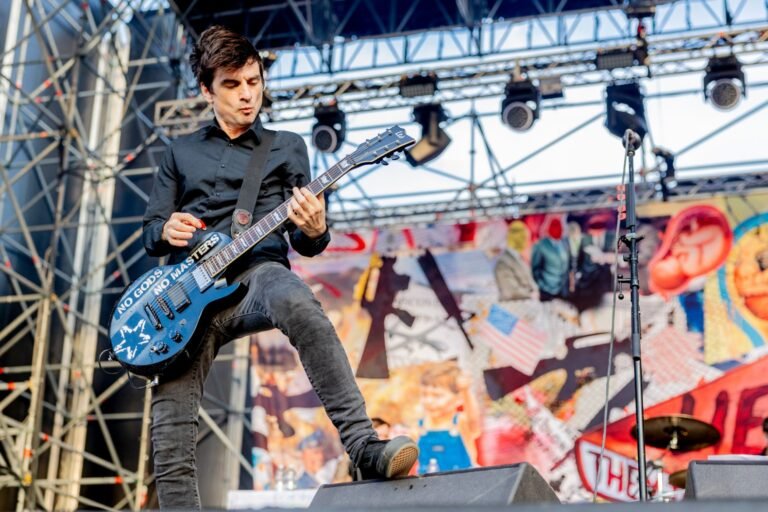Anti-Flag’s Justin Sane Ordered to Pay $1.9 Million in Civil Rape Case Judgment…see more…
Justin Sane, frontman of the now-disbanded punk rock band Anti-Flag, has been ordered to pay $1.9 million in damages to a woman who accused him of rape. The judgment, delivered this week by a Pennsylvania civil court, follows a tumultuous year for the singer after multiple allegations of sexual assault surfaced, prompting the abrupt breakup of the band in 2023.
The civil lawsuit, filed under a pseudonym to protect the accuser’s identity, alleged that Sane (real name Justin Geever) raped the woman in 2010 following a concert in Pittsburgh. The court found Sane liable for sexual assault, emotional distress, and related damages. While he has denied the allegations, the court sided with the plaintiff, awarding a total of $1.9 million in compensatory and punitive damages.
This landmark ruling follows over a year of mounting accusations against Sane from multiple women. The plaintiff in this case was one of several who came forward with accounts of coercion and assault, but hers was the first to reach trial. The civil nature of the case means no criminal conviction has been issued, but the ruling sends a strong message about accountability, especially within music communities that have long struggled with allegations of abuse.
The case gained momentum in 2023 when the podcast Enough. published interviews with several alleged victims of Sane’s behavior. Shortly afterward, Anti-Flag disbanded without warning, citing the seriousness of the allegations. The band’s social media accounts went dark, and their website was taken offline. Former band members later issued a joint statement expressing their shock and heartbreak, claiming they had no prior knowledge of the accusations.
“This has been a painful process for everyone involved,” the plaintiff’s attorney said in a statement following the ruling. “But it’s also a critical one. Our client came forward bravely, knowing the risk of retraumatization and public scrutiny. Today’s verdict is an important step toward justice.”
Sane’s legal team has signaled their intention to appeal the ruling, arguing that the case was unfairly influenced by the media and the broader social climate surrounding #MeToo-era allegations. “Mr. Geever maintains his innocence and believes the facts were misrepresented,” his attorney said. “We will pursue all available legal avenues.”
Despite those intentions, legal experts say civil cases like this one typically hinge on the preponderance of evidence—a lower bar than criminal cases, which require proof beyond a reasonable doubt. In this trial, the jury found the plaintiff’s testimony credible and supported by circumstantial evidence, including contemporaneous messages and witness accounts.
Anti-Flag had long been known for its progressive politics, vocal support of feminist causes, and anti-authoritarian stance. Founded in 1988, the band built a loyal fan base over three decades by addressing issues like war, police brutality, and social justice. The contrast between those messages and the allegations against Sane has created a painful reckoning for fans.
“It feels like betrayal,” said longtime fan Maria Gonzalez. “Anti-Flag was a band that meant a lot to me growing up. Their lyrics inspired me to speak up, to challenge the system. To learn that their lead singer was allegedly abusing his power—it’s devastating.”
Several former collaborators have publicly denounced Sane since the allegations emerged. Punk icon Kathleen Hanna, who once shared a stage with Anti-Flag at a benefit concert, said in a social media post, “We must believe survivors. The punk community is not immune to predators, and we have a duty to call them out.”
The broader music industry has also taken note. Festivals and venues have dropped past Anti-Flag material from their playlists and lineups, and several organizations have launched internal reviews into artist conduct. Some promoters have begun instituting formal codes of conduct and vetting procedures in response to rising public concern about artist accountability.
This case is part of a wider wave of reckoning in the punk and alternative music scenes, where long-standing cultures of male dominance and blurred boundaries have come under increased scrutiny. Artists such as Marilyn Manson and Brand New’s Jesse Lacey have also faced allegations in recent years, signaling a shift in how the industry handles such claims.
Advocates say the ruling against Sane may empower more survivors to come forward. “When courts take sexual violence seriously, it creates a ripple effect,” said Tamara Eldridge, director of Voices Heard, a nonprofit that supports survivors of assault. “This decision won’t undo the harm, but it validates the courage it takes to speak up.”
Meanwhile, Anti-Flag’s former members—Chris No. 2 (Chris Barker), Chris Head, and Pat Thetic—remain out of the spotlight. In prior interviews, they expressed feeling blindsided by the allegations and noted that they had ceased contact with Sane. None have pursued solo musical projects publicly since the band’s dissolution.
With the judgment now official, Sane’s future as a public figure or artist is in serious doubt. Though he has yet to issue a personal statement in response to the ruling, his legal team has requested a temporary stay on the enforcement of the judgment pending appeal.
For many fans, however, the damage is already done. “This changes everything,” said Sean Murray, a Pittsburgh-area musician. “It’s a reminder that no amount of political messaging or good intentions can excuse personal harm. We have to hold our heroes accountable too.”
The ruling concludes a major chapter in a deeply unsettling saga—but it’s unlikely to be the last. Additional civil suits may follow, and the cultural conversation around power, consent, and justice in music will almost certainly continue. In the meantime, survivors and advocates alike hope this decision marks a turning point—one where truth is no longer silenced, and those who abuse their
power are forced to answer for it.



